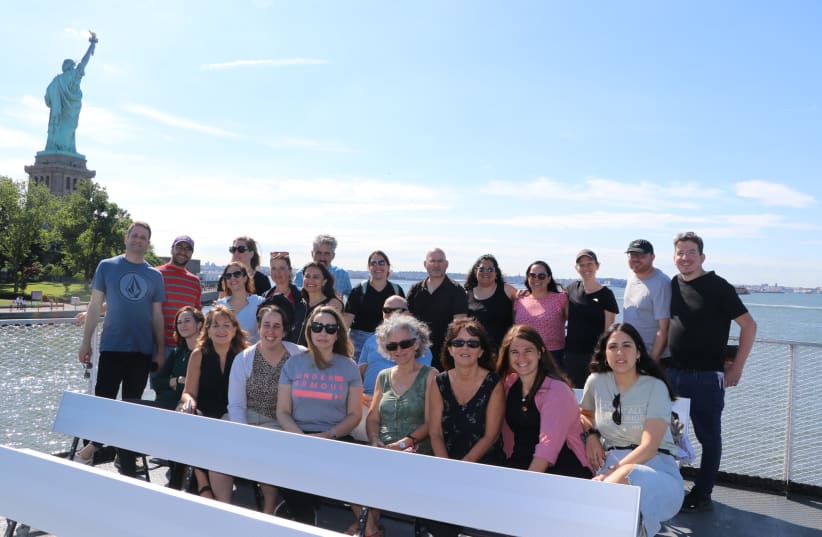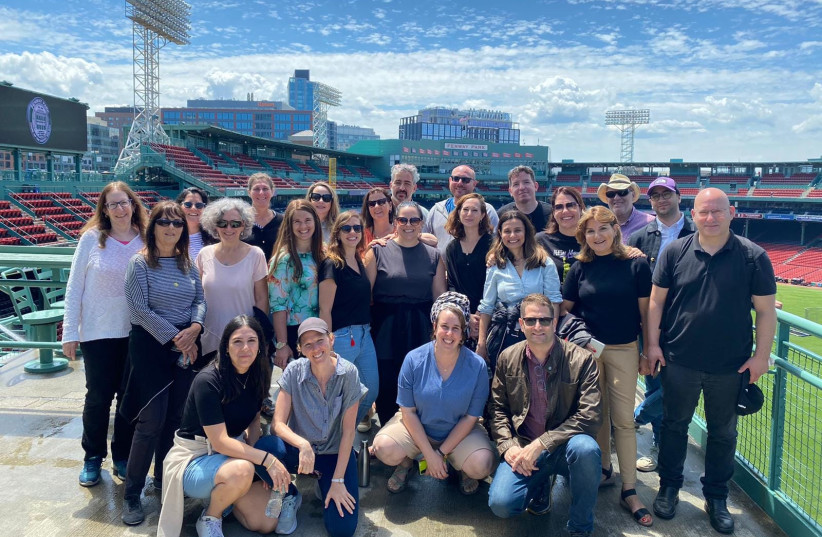Up until a decade ago, you couldn’t learn about the world's second-largest Jewish community, the US Jewish community, in any Israeli academic institution. Ten years ago, the Ruderman Program for American Jewish Studies was established at the University of Haifa and since then, hundreds of MA graduates are either working in the Israel-Diaspora sphere or telling the story of American Jews in a wide range of Israeli sectors.
“The Ruderman Program for American Jewish Studies was an initiative of Jay and Shira Ruderman and Prof. Gur Alroey who came up with the idea,” Dr. David Barak-Gorodetsky, head of the program, told The Jerusalem Post this week in honor of its tenth anniversary.
“The program was born since unfortunately American Judaism was not recognized by Israelis and definitely not taught in the education system, even though it is the second largest Jewish community in the world,” Barak-Gorodetsky said.
“The program was born since unfortunately American Judaism was not recognized by Israelis and definitely not taught in the education system, even though it is the second largest Jewish community in the world.”
Prof. David Barak-Gorodetsky
According to Barak-Gorodetsky, “the program has been running for ten years and every year, another 25 graduates are integrated into different parts of Israeli society. In many situations, our alumni work in key positions in the field of Israel-Diaspora relations.”
Barak-Gorodetsky explained that from his perspective, the program has affected Israeli society and that there is a lot less ignorance towards American Jews as a result. “Israelis know a lot more today about American Jews than they did a decade ago, but at the same time, we are now at a point where the tension between the two communities is significant and central.”
Interestingly, for the first time since its establishment, this year, the American Jewish Studies program will not only teach its students about American Jews history and its current state, it will also try and offer solutions to the conflict between two of these communities. “We are currently directing the program to address the difficulty that exists between Israel and US Jews. We want to try and give students tools to try and promote solutions between both sides of this conflict.”
Barak-Gorodetsky explained that “Our assumption is that the ability to deal with the current situation is based on knowledge and we understand that it is lacking on both sides. Although US Jews know quite a bit about Israel, sometimes there is a certain bias. The goal is to give our students a complex academic understanding of the relationship.”
A complex academic understanding of Israel-US Jewish relations
Barak-Gorodetsky explained that he and his academic staff are therefore integrating more elements of sociology and anthropology to the studies. “We’re moving from a more historical focus and going to put a spotlight on many contemporary issues. This is reflected in our lectures and of course in our tour of the American Jewish communities at the end of the school year.”
The program includes a 10-day field trip to the United States. During the trip, students meet American Jewish students and Jewish leaders, visit various museums and attend lectures by prominent members of the local community..
Some of the alumni of the program include outgoing MK Shirly Pinto, chief operating officer of the Jewish Agency Yehuda Setton, journalists such as Idan Kveller (Army Radio) and Lital Shemesh (Channel 14), CEO of the Labor Party Eran Hermoni, CEO of the World Mizrachi Movement Rabbi Doron Perez and others.
Barak-Gorodetsky has been teaching in this program for the past 7 years and his specialty is the current religious streams of American Jewry. He shared that 7 years ago, a large percentage of the students came with very little background about American Jews, but that isn’t the case anymore. “Very few begin our program without any knowledge or background of American Jewry or religious streams. There is a deepening of the understanding of the need to get to know one another.” Another trend, according to Barak-Gorodetsky is the increase of students from the religious Zionist sector: “This sector has taken upon itself the role of an elitist group, serving and caring for the Jewish people - which emerges from their religious Zionist ideology and thought. There is a lot of interest from this sector.”
He added that there is less of a negative attitude towards progressive religious streams. “In the past, it was easier for students to speak critically about the Reform or Conservative movements. Today there is a certain understanding that arises, recognition of how significant the Jewish identity is for American Jews.” He asked to note that this isn’t “necessarily a discourse of acceptance,” but rather “an understanding that there is a partner on the other side that this issue is important to. Reform and Conservative Jews are less considered marginal and esoteric as they were when our program began.”
In addition to the master's degree, there are 12 students writing a doctorate on American Jewry and it is considered to be the largest group of academics in the world professing on this topic in one university.
Asked where he sees this program growing in a decade from now, Barak-Gorodetsky answered that “perhaps as an international program with American students learning about Israeli Judaism. The need exists on both sides and I would like to see American students learn on our campus about this delicate relationship.”
The Ruderman Family Foundation was a groundbreaking force in Israel, bringing up the education of Israeli opinion leaders about the second largest Jewish community in the world - the American Jewish community. In an interview with the Post, he explained that he learned this theory of change from AIPAC, the pro-Israel DC lobby.
“I used to work for AIPAC and I learned a lot about how members of congress were brought to Israel,” Ruderman said. “I remember interacting with a few members of Knesset and they had an overly simplified view of US Jews. It mainly focused on money and Aliyah. These MKs spoke of the US military assistance to the IDF but none of them was talking about the American Jewish community,” he recalled.
“The first thing that we did was I wanted to educate Israelis about US Jews,” Ruderman explained and added that the American Jewish Committee did something similar in the past, but didn’t continue. Together with former MK Ronit Tirosh they started a caucus in the Knesset, where they focused on American Jewry. “Ronit told me you have to meet Prof. Gur Alroey from the University of Haifa. We had a great discussion but didn't hear from him again,” he said. Alroey pitched creating a master's degree focusing on American Jewry. The Rudermans later asked him why he didn’t follow up on the meeting. He answered that he thought that they weren’t interested in investing. “He is the nicest person and dedicated to the history of American Jewry. We started with one course and that’s how this degree originated.”
Ruderman shared that he didn’t get any pushback throughout the years from the university but actually from members of Knesset. “I remember that during our first caucus, the late MK David Rotem pointed a finger at me and said: ‘You’re not going to tell us what to do.’”
Another pushback was from the Israeli media. The Ruderman foundation has been hosting delegations of senior Israeli journalists and MKs to the US in order to expose them to North American Jews.
“An editor in Yedioth Ahronot newspaper told us that ‘we [Israel] don’t need American Jews to help us.’ I asked him, ‘what about the military aid?’ He said ‘we don’t need that aid.’ I remember a meeting with [former president] Reuven Rivlin and he said ‘tell all your friends to make aliyah.’ There was that type of pushback.”
He explained that the attitude of many Israelis was under the lines of “if you want to come to Israel, great, but don’t tell what you think we should be doing.”
“We had no idea what would come from our work in this field. We planted seeds and were hopeful that people would be influenced. I’ve been preaching respect towards American Jews,” Ruderman said.
“The American Jewish community is a diverse community,” he said and added that “Jewish organizations don't represent the majority of US Jews. I wish that Israelis would just be respectful because we need each other. On the other hand, Americans have to understand that Israel is a different world and society. You can't project your values on a different society.”
Regarding the program at the University of Haifa, Ruderman said that “whenever I visit the program I meet the students for discussion. It’s amazing to see how people were emotional during the discussions and shared that the program shaped their lives in the future. I didn’t expect that. For me, education is either preparing you for a career or broadening you and having a better life. I was taken back by the emotion.”
He said that the students are “a positive force in Israeli society,” and added that “anyone should have access to the content telling the story of American Jews.”
Barak-Gorodetsky asked to add one more thought regarding the election results and the right-wing government expected to be established here in the next few weeks. “It is important for us in our program to change the equation that says that the relationship between Israel and the Diaspora is only a matter of one side of Israeli society,” he said, meaning Israelis who are more to the left or secular, as are most American Jews. “It is important that all parts of the Israeli society understand the need and importance of this connection. I think we are at a critical point in time.”
Barak-Gorodetsky explained that in his opinion, “change is needed on both sides: On the Israeli side, there needs to be recognition of the centrality of the liberal identity among American Jews. From the American side, there needs to be an understanding that Israel will never be compatible with their liberal dream: A country with sovereignty challenges that are not compatible with American life. On both sides, we need an understanding that we are on the brink of an abyss. We need to rethink in order to reach a deeper understanding on which to build another building of our relationships with each other.”

